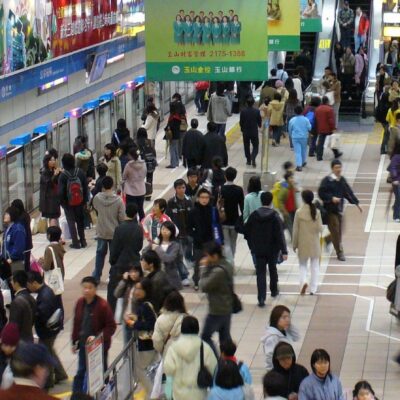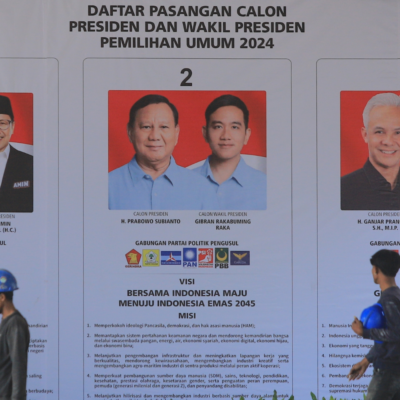The COVID-19 pandemic has been the most globally disruptive event since the Great Depression in the 1920s and 1930s. It has substantially impacted our way of life over more than two and a half years and has forced us to rethink how we deal with the health, economic, social and environmental challenges ahead.
In this special edition, emerging and established academics from Asian Studies, geography, politics, sociology and environmental studies share their latest research and analysis on the pandemic’s effects on politics, society and environment in Asia and Australia.
Political and social challenges
Some of the most significant (post-)COVID challenges in Asia are unfolding in China. China continues to enforce a so-called ‘zero-COVID’ policy which is characterised by huge-scale, rapid and frequent testing, strict lockdowns, isolation, quarantine and border closures. Such an approach has contributed to the very low pandemic death rate in China since COVID-19 began in Wuhan in late 2019. Chinese leaders strongly believe that the ‘zero-COVID’ approach could only be applied for such long time in China mainly due to its political system and the Chinese Communist Party’s (CCP) mobilisation capacity. However, such approach is not only criticised as ‘brutal’ in the West, but is also being questioned by Chinese citizens, especially since the recent lockdown in Shanghai from March 28 to June 1, 2022. Many expressed anger at the rigidity and arbitrary nature of public health measures which obstructed obtaining regular medical services, food, and other daily necessities and widespread popular resentment could be observed in social media.
One of the major reasons China has been able to continuously implement its ‘zero-COVID’ policy is through tech-enabled authoritarianism – ‘Chinese-engineered digital surveillance and tracking systems’. China’s fight against COVID-19 has been accompanied by an unprecedented level of mass surveillance, involving the extensive collection of personal and private information. Tek Sheng Kevin Lo critically examines the rise of the surveillance state in China. He recognises that surveillance can massively increase governing capacity, resulting in the government having access to new tools to address intractable policy problems such as climate change. But significant concerns remain in relation to excessive and oppressive violations of privacy and individual liberty.
Grassroots personnel in China such as social workers have been under particular pressure because they’ve been tasked with maintaining virus prevention and control mechanisms while also meeting the health and other needs of individuals in their communities. Leiheng Wang examines the pressures on workers who have had to balance the tension between whole-of-nation policy and more local/individual needs during the pandemic.
COVID-19 has brought significant shifts in China’s job market, which looks set to hinder ‘influence building’ by Western democracies. Dan (Diane) Hu draws our attention to how the Chinese public service has contracted in size and is favouring Chinese-educated students over those who have been educated in the West. Will the world be grappling with a more inward-looking China with fewer government personnel with a deep understanding of Western political systems?
North Korea also continues to pursue a ‘zero-COVID’ policy. Jasmine Barrett finds that the full extent of the impact COVID-19 and related public health measures remains opaque.
Environmental challenges
While we may celebrate the temporary reduction of carbon emissions due to reduced economic activity across the world since the pandemic began, the longer-term impacts may negatively impact China’s transition away from carbon energy. As the world’s largest carbon emitter and the second-largest economy, this would profoundly determine whether the world can limit a temperature increase to 1.5 °C above pre-industrial levels. Dong Wang argues that given the significant challenges of economic recovery, China might seek more energy independence through conventional energy sectors.
In South Korea, though, Theo Mendez argues that it appears likely that the Yoon government will retain its commitment to net zero emissions by 2050, even if the President plans to reach this goal in a different fashion to his predecessor.
Another key (post-)COVID environmental challenge is unfolding in Indonesia’s palm oil sector, particularly in relation to Chinese enterprises. Monica Xiao Tan and Ardhitya Eduard Yeremia examine the Julong Group, China’s biggest palm oil player, and the challenges of environmental degradation and the rights of local workers.
Pandemic-related racism and mental health problems
COVID-19 has caused ‘invisible’ impacts such as racism and mental health challenges, especially from the perspectives of women and youth. Based on interviews with 20 Asian women living in the state of Victoria, Australia, Sylvia Ang examines the intersection between racism and sexism, finding that the lack of attention to Asian women’s experiences of racism obscures the fact that Asian women encounter racism more than their male counterparts.
International students in Australia have often borne the brunt of racism in that nation during the pandemic. Jun Ohashi interviews three Chinese students in Australia, revealing that border closures, actual and perceived discrimination, and mental health problems are all issues that universities need to take into greater account in terms of creating the most safe and inclusive communities possible, especially during pandemic times. Surjeet Dhanji and Mousumi Mukherjee reveal the specific challenges faced by Indian international students who left Australia after the then Australian Prime Minister stated that it was time for international students to ‘make your way home’. Those who did so essentially became ‘stranded’ in India with no idea when they could return to Australia. In the absence of any direct political response, these students took to online activism to pressure the Australian government to address their concerns.
Paul Yip directly examines pandemic-related mental health issues. In the context of Hong Kong, continuing onerous quarantine requirements and China’s ‘zero-COVID’ policy mean that pandemic-related emotional disconnection continues. How can the lessons for mental health policy in relation to COVID-19 be applied in the future?
Pandemic (im)mobility
COVID-19 has changed people’s mobility and lifestyles, both short and long-term. National borders were closed and migrants forced to return to countries which struggled to reintegrate them. Building on recent research from the UN Human Rights Office, Pia Oberoi seeks to understand the place of (post-)COVID entry and stay pathways of migrants in Asia. Is there scope to answer the call of the UN Secretary General to reimagine mobility in the aftermath of the COVID-19 pandemic?
COVID-19 has also made us rethink human mobility in the context of small islands as a spatial and social space. Using a case study from the Sangihe islands in the northern part of Indonesia, Naimah Lutfi Abdullah Talib highlights how COVID-19 has reshaped social relationships and decisions on whether to travel during the pandemic.
As we see in this edition, the pandemic has shed light on the resilience of individuals and communities often considered most vulnerable. At the same time, however, it has also in many ways revealed the weakest links in government and society. The (post-)COVID challenges for Asian governments and societies are enormous. It will not be easy for Asia to recover economically in a time of great change in the global order, protectionism, and intense competition between the USA and China in the region. The short-term environmental benefits of reduced economic activity will inevitably be overshadowed by long-term environmental challenges; and according to an OECD Policy Responses Report, the long-term environmental effects are larger than the macro-economic ones. Additionally, recovering from the social crises and social impacts of COVID-19 will be an even greater challenge as this affects the entirety of Asian society, rather than being limited to a single country. How Asia as a region and each country with it will address these post-COVID challenges requires more research attention.
Authors: Professor Mark Wang and Associate Professor Jay Song.
Image: A worker hangs her hands over the testing holes during a 1 minute break period in between day-long consistent testing services. Beijing, June 2022. Credit: Eric Lin/Unsplash.




